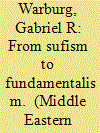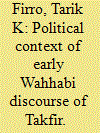| Srl | Item |
| 1 |
ID:
090410


|
|
|
|
|
| Publication |
2009.
|
| Summary/Abstract |
Both the Wahhabiyya and the Mahdiyya were based on different styles of tajdid (renewal). The Mahdiyya was based on the charisma of its leader and was a leader oriented tajdid movement. The Wahhabiyya, on the other hand, was a message oriented movement, which viewed Sufism with hostility. In contrast to Sufi traditions, which embraced al-Mahdi al-Muntazar, who claimed that he was _Khalifat Rasul Allah, Ibn 'Abd al-Wahhab embraced tawhid (Unitarianism), as his guiding message. Consequently, the neo-Mahdiyya, which emerged during the twentieth century, shied away from radicalism, and became part of the Sudanese Political establishment. The Wahhabiyya, on the other hand, maintained its tajdid message, and gradually emerged as part of the Jihad oriented, Islamic fundamentalism.
|
|
|
|
|
|
|
|
|
|
|
|
|
|
|
|
| 2 |
ID:
126640


|
|
|
|
|
| Publication |
2013.
|
| Summary/Abstract |
This article compares the takfiri discourse (accusing people of being infidels) of the first and second generation of Wahhabi scholars with that of Muhammad Ibn 'Abd al-Wahhab, the founder of the Wahhabiyya. The article shows that these scholars had revised Ibn 'Abd Wahhab's position toward infidelity; a position which had been adopted by many Wahhabi scholars until the beginning of the nineteenth century. In their revision, they put an end to the ambivalent position toward takfir, emphasizing that warfare was the suitable means of interacting with religious and political opponents. To justify their approach, they reinterpreted not only the writings of the founder of Wahhabiyya but also those of Ibn Taymiyya and other Hanbali scholars. Their takfiri discourse remained alive among large segments of the masses and religious scholars in Sa'udi Arabia until today, though some Sa'udi kings and princes sometimes denounced it.
|
|
|
|
|
|
|
|
|
|
|
|
|
|
|
|